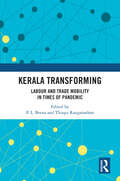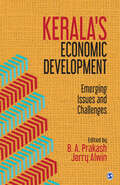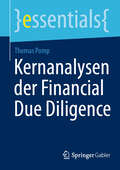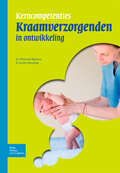- Table View
- List View
Kerala Transforming: Labor and Trade Mobility in times of Pandemic
by Edited by P. L. Beena and Thiagu RanganathanThis book examines Kerala's recent development trajectory and highlights the impact of COVID-19 on its economy. It analyzes Kerala's growth and structural transformation while engaging critically with issues related to employment and migration. The book delves into policies aimed at reintegrating return migrants into Kerala’s development process. It examines the implications of Free Trade Agreements and policies initiated by the Government of India under the WTO regime on agriculture. The chapters in the book also investigate the impact of the growth trajectories on distributional aspects of inequality and social mobility.Timely and topical, the book will be an indispensable resource for students and researchers of economics, development studies, trade, labour and migration, political economy, Kerala economy, and South Asian studies.
Kerala: The Paradoxes of Public Action and Development
by Joseph TharamangalamRevised and edited papers presented during a two-day workshop in Trivandrum in 1999.
Kerala’s Economic Development: Emerging Issues and Challenges
by B. A. Prakash Jerry AlwinFocusing on current economic problems, Kerala′s Economic Development: Emerging Issues and Challenges provides an in-depth analysis of the major development issues and challenges faced by the state. Kerala’s development experience has attracted worldwide attention due to its paradoxical development: attaining higher quality of life of people on the one hand and continuation of the backward productive sectors on the other. The state’s economy remained backward in many respects and relied heavily on the remittance of Keralite emigrants. The implementation of liberalisation and globalisation policies since 1991 radically altered the growth process and Kerala achieved higher rates of investment and growth and greater technological change. These policies, however, have not only provided enormous opportunities, but also new challenges. This book examines the state’s economic growth as well as the issues that have accompanied the policy changes.
Kermit PPI
by Sarah Mehta Kyle R. Myers Matt GrennanLaunched in 2011, Kermit PPI helped hospitals save money on expensive orthopedic implants and devices by enabling them to renegotiate their contracts with device manufacturers and better monitor compliance. In 2021, as they look to grow, they are entertaining two options: recruiting new customers and expanding their service offerings.
Kernanalysen der Financial Due Diligence (essentials)
by Thomas PompDie Financial Due Diligence untersucht die aktuelle finanzielle Situation sowie die historische und geplante finanzielle Entwicklung eines Unternehmens und ist damit ein wesentlicher Prozessschritt bei M&A-Transaktionen. Das Buch fokussiert sich auf die Kernanalysen der Financial Due Diligence und erläutert diese mit zahlreichen Praxisbeispielen.
Kerncompetenties kraamverzorgenden in ontwikkeling
by Pieternel Dijkstra Desirée Groen-DeusingsAls kraamverzorgende moet je tegenwoordig sterk in je schoenen staan. Dit komt enerzijds doordat de gezinssamenstellingen ingewikkelder worden. Anderzijds doordat er meer van je wordt verwacht dan alleen maar instructies geven en schoonmaken. Het is dus belangrijk dat je de juiste psychologische en sociale eigenschappen hebt. Hoe kun je die eigenschappen ontwikkelen? In kerncompetenties kraamverzorgenden in ontwikkeling komt dat uitgebreid aan de orde. In elk deel wordt er een thema behandeld. In het eerste deel houd je je bezig met de vraag wie ben ik als mens? Je kijkt naar je sterke en zwakke punten en de manier waarop je met emoties omgaat. Hoe kun je jezelf het beste ontwikkelen? In het tweede deel analyseer je jouw manier van samenwerken aan de hand van de vraag wie ben ik als professional?. Je leert hoe je kunt groeien in je werk. In het derde deel bekijk je hoe je het beste uit je werk en uit jezelf kunt halen. Hoe ga je om met stress?Sluit je werk nog steeds aan bij je interesses? In elk deel staan testen en opdrachten. Door deze te maken krijg je inzicht in je eigen functioneren. Je krijgt informatie en adviezen die je nodig hebt om ervoor te zorgen dat de baby en het kraamgezin een goede start maken.
Kernel Density Estimation Based on Grouped Data: The Case of Poverty Assessment
by Camelia Minoiu Sanjay G. ReddyA report from the International Monetary Fund.
Keroche (A): Fighting for Share in the Kenyan Alcoholic Drinks Market
by Ramon Casadesus-Masanell Pippa Tubman ArmerdingThis case discusses the challenges faced by Kenyan alcoholic drinks producer Keroche Industries Limited in 2003, when the Kenyan government accused the company of manufacturing and selling substandard alcoholic drinks, revoked its liquor licenses, and shut down its manufacturing facility. At the same time, the multinational East Africa Breweries Limited (EABL) was planning to enter the same low-income market as Keroche. The husband and wife duo Tabitha and Joseph Karanja had founded Keroche in 1997 with the aim of providing Kenya's low-income consumers with a cheap and safe alcoholic drink alternative, since these consumers frequently turned to unregulated, informally brewed alcohol that could blind or even kill those who drank it. However, the government was now claiming that Keroche, too, produced substandard drinks. Tabitha Karanja was convinced that EABL was behind these government attacks. The case describes the history of Keroche and EABL, and asks what Tabitha Karanja might do now to combat the allegations of the government and respond to the factory closing.
Keroche (B): Considering Entry into the Kenyan Beer Market
by Ramon Casadesus-Masanell Pippa Tubman ArmerdingThis case discusses the situation of the Kenyan alcoholic drinks producer Keroche in July 2004, when co-founder Tabitha Karanja was debating whether to enter the Kenyan beer market. Doing so would mean direct competition with the multinational EABL in an industry and market where Keroche had no experience. It would also require significant investments in manufacturing capacity, technology, and marketing. The case asks whether Tabitha Karanja should enter the Kenyan beer market, and if so, whether she should continue to target the low- to middle-income consumers with whom she had built the Keroche business, or shift the company's focus toward the upper middle- and high-income consumers who had been customers of EABL. The case also describes how the company successfully rebounded from the plant closures, litigation, and media attacks of the previous year, including through court battles and an extensive public relations campaign.
Keroche (C): The Excise Tax Increase
by Ramon Casadesus-Masanell Pippa Tubman ArmerdingThis case discusses the Kenyan government's decision to increase excise taxes on wines in 2007. The tax increase would cause an average increase in price of 367% on Keroche's fortified wines. Meanwhile, Keroche's competitor EABL had effectively lobbied the government for its Senator beer to receive a zero-tax rating. Since Keroche's wines targeted low-income consumers, Tabitha Karanja knew they would no longer be able to buy its products after the price hike. To make matters worse, Keroche was in the middle of building a brewery, with plans to enter the beer business in 2008. Now Tabitha Karanja had to decide how to react to this tax increase. One option was to lobby the government for a repeal of the tax increase (a long and costly process). Another was to abandon the wine business altogether, either in favor of the vodka Keroche already produced or another alcoholic drink.
Keroche (D): Transforming the Core Business
by Ramon Casadesus-Masanell Pippa Tubman ArmerdingThis case describes Keroche co-founder Tabitha Karanja's decision to exit the wine business following the Kenyan government's 2007 increase in excise taxes on wine. In August 2007, Keroche introduced the vodka drink Viena Ice as a replacement for its fortified wines, and in August 2008, it entered the beer market with the launch of its Summit Lager premium beer. The case describes the success of Keroche's products in the Kenyan beer market, despite an initial intense advertising campaign by Keroche competitor EABL for its own Tusker beer.
Keroche (E): Considering Additional Capacity
by Ramon Casadesus-Masanell Pippa Tubman ArmerdingThis case describes Keroche's growth after entering the beer business in 2008. Although the company was operating at full capacity and not able to fulfill all of its orders, Tabitha Karanja had set a goal of growing Keroche's share of the Kenyan beer market from slightly over 1% to 20%. In 2010, Tabitha Karanja had invested US$2.5 million in a PET bottling line to increase capacity of Keroche's vodka drinks. However, in 2010, the government had passed a law requiring alcoholic drinks to be sold in glass containers, which made the PET investment obsolete. Now, in 2011, Tabitha Karanja sought new funding for a glass bottling line. The case asks whether, in the midst of these new investments, it was also time to expand beer capacity by building a new and larger plant.
Keroche (F): Success and Future Growth Plans
by Ramon Casadesus-Masanell Pippa Tubman ArmerdingThis case describes Keroche co-founder Tabitha Karanja's 2012 decision to invest in additional production capacity. In November 2012, with a loan from Barclay's bank, Keroche began constructing a new state-of-the-art beer brewery using German technology. The new plant, completed in March 2015, greatly increased Keroche's beer production capacity. The company also made investments to increase capacity for its Viena Ice and Crescent vodka drinks. The case describes Tabitha Karanja's aggressive production, marketing, and distribution strategy, and the company's resulting growth by 2017. It also describes Keroche's ongoing competition with EABL, including a 2016 EABL lawsuit against Keroche, and Keroche's continuing struggles with the Kenyan government.
Kerr-McGee
by Andre F. Perold Robin GreenwoodActivist investors Carl Icahn and Barry Rosenstein acquire a stake in Oklahoma-based company Kerr-McGee. They demand two board seats and ask the company to make several operational and financial changes, including the repurchase of equity and divestiture of their chemicals business. The case protagonist, Luke Corbett, CEO, opposes these changes.
Kerry Group: Inspiring Food, Nourishing Life
by Jose B. Alvarez Forest L. Reinhardt Tonia Labruyere Damien McLoughlinThe Irish company Kerry Group, one of the leading global players in the taste and nutrition industry, wants to ensure its future growth in developing and developed markets. Founded in 1972 as a dairy cooperative, it had grown into a provider of taste and nutrition solutions through many acquistions, but also through organic growth. In 2020, Kerry rolled out its new sustainability strategy, "Beyond the Horizon", with the goal of reaching 2 billion people a day with sustainable nutrition solutions by 2030. In order to reach that goal, Kerry had identified channels where it could grow and that were compatible with environmental sustainability, namely food waste reduction, plant-based protein, and proactive health products. Kerry's customer base was changing as well, with many FMCG companies losing market share to new, innovative market entrants in the food and nutrition space. Kerry was looking for ways to attract those new customers, while helping its existing customers shift to more sustainble solutions as well. Kerry had already adapted its recruitment strategy to meet its changing needs, but it still had to simplify its organization to better integrate new acquistions and talent. Would this be enough to reach the 2030 goal of 2 billion people reached daily?
Ketchup and Hotdog Synergies: Intangibles Created by the Kraft Heinz Merger
by Paul M. Healy Marshal HerrmannCase
Keurig
by Jeremy B. Dann Paul W. MarshallNick Lazaris becomes Keurig's third CEO in three years, after one founder was fired and the other decided to leave the company. He inherits a company that has made several abortive attempts to launch its new coffee brewing system. Now, problems with crucial suppliers threaten the next proposed launch plan.
Keurig and Green Mountain Coffee Roasters
by Shikhar Ghosh Thomas R. Eisenmann Lauren Barley Paul W. MarshallProvides background information for a negotiations exercise in which students will represent either Keurig, a startup that has developed an innovative "portion pack" coffee brewing solution, or Green Mountain Coffee Roasters (GMCR), a fast-growing premium coffee roaster interested in licensing Keurig's technology. The negotiation will determine the royalty to be paid to Keurig by GMCR, who will bear capital expenditures, and whether GMCR secures exclusive distribution rights to Keurig's system.
Keurig: Hostile Takeover (B)
by Paul W. Marshall David J. Donahue John H. Lynch Philip B. RichSupplement to case 918401.
Kevin D. Johnson: To Be a Venture Capitalist or an Operator?
by Jo Tango Alys FerragamoIn May of 2021, Kevin D. Johnson had just graduated from a rigorous Executive MBA program, and he quickly needed to decide on his next career move. Johnson was the founder and CEO of a successful media company, Johnson Media Inc., but his career goals had shifted while at business school. He wanted to use his talents to help other BIPOC entrepreneurs access capital and provide opportunities to create intergenerational wealth. Johnson evaluated his four options: work full-time at an online platform dedicated to connecting Black founders with funding; join a BIPOC-focused venture capital ("VC") firm; pursue a job at an established VC firm; or continue scaling his media company. Which option would Johnson choose?
Kevin McCarthy and Westlake Chemical Corp (A)
by Edward J. RiedlExamines forecasting earnings/performance for a commodity chemical firm during a period of high uncertainty, highlighting the combined effects of input process (natural gas), industry capacity/utilization, and cyclicality. Assuming the role of Kevin McCarthy (the top chemical industry analyst in 2004), students must analyze macro, industry, and firm-level data to determine the future performance of this firm.
Kevin Sharer at Amgen: Sustaining the High-Growth Company (A)
by Andrew N. Mclean William W. GeorgeIn 2005, Kevin Sharer reflects on the challenges of sustaining the growth and success that have brought Amgen to the position of third-largest U.S. pharmaceuticals company by market capitalization and the challenge of maintaining the higher P/E ratio it traditionally held. Profiles the leadership and development of Sharer, tracing his career from the U.S. Navy through McKinsey and Co., GE, and MCI to his entrance at Amgen as president and COO. Provides information on the history and business of Amgen and its science-based discovery model. Provides information about the protagonist's career, management style, learning style, aspirations, and motivations. Raises questions about leadership in sustaining discovery-driven growth and leadership succession.
Kevin Simpson
by Linda A. Hill Melinda B. ConradFollows Kevin Simpson, a second-year Harvard Business School 1990 student, through his job search to his final decision between two very attractive but different job offers: a job as an international marketing manager at Eli Lilly and Co., a leading multinational health product corporation; and a position as the assistant to the president of Haemonetics, an entrepreneurial company in the biomedical equipment field. Addresses the factors Simpson should consider when making job choices as well as the issues he faces as an African-American professional.
Key Account Controlling in der pharmazeutischen Industrie
by Sabine RinauerDas deutsche Gesundheitssystem ist ein komplexes Regulierungsgefüge. Damit die Marktteilnehmer die Konsequenzen ihres Handelns einschätzen können, werden die Kenntnis von Interdependenzen und die frühzeitige Information über Veränderungen der Rahmenbedingungen immer wichtiger. Durch die Konsolidierung der Nachfragestrukturen gewinnt die Fokussierung auf die zentralen Schlüsselkunden für die Arzneimittelhersteller an strategischer Bedeutung. Die damit verbundene Veränderung im absatzwirtschaftlichen Geschäftsmodell verändert den Informations- und Koordinationsbedarf maßgeblich und stellt somit neue Anforderungen an das Controlling. Neue praxistaugliche Instrumente zur Entscheidungsunterstützung und Verhaltenssteuerung im pharmazeutischen Key Account Management werden benötigt.





